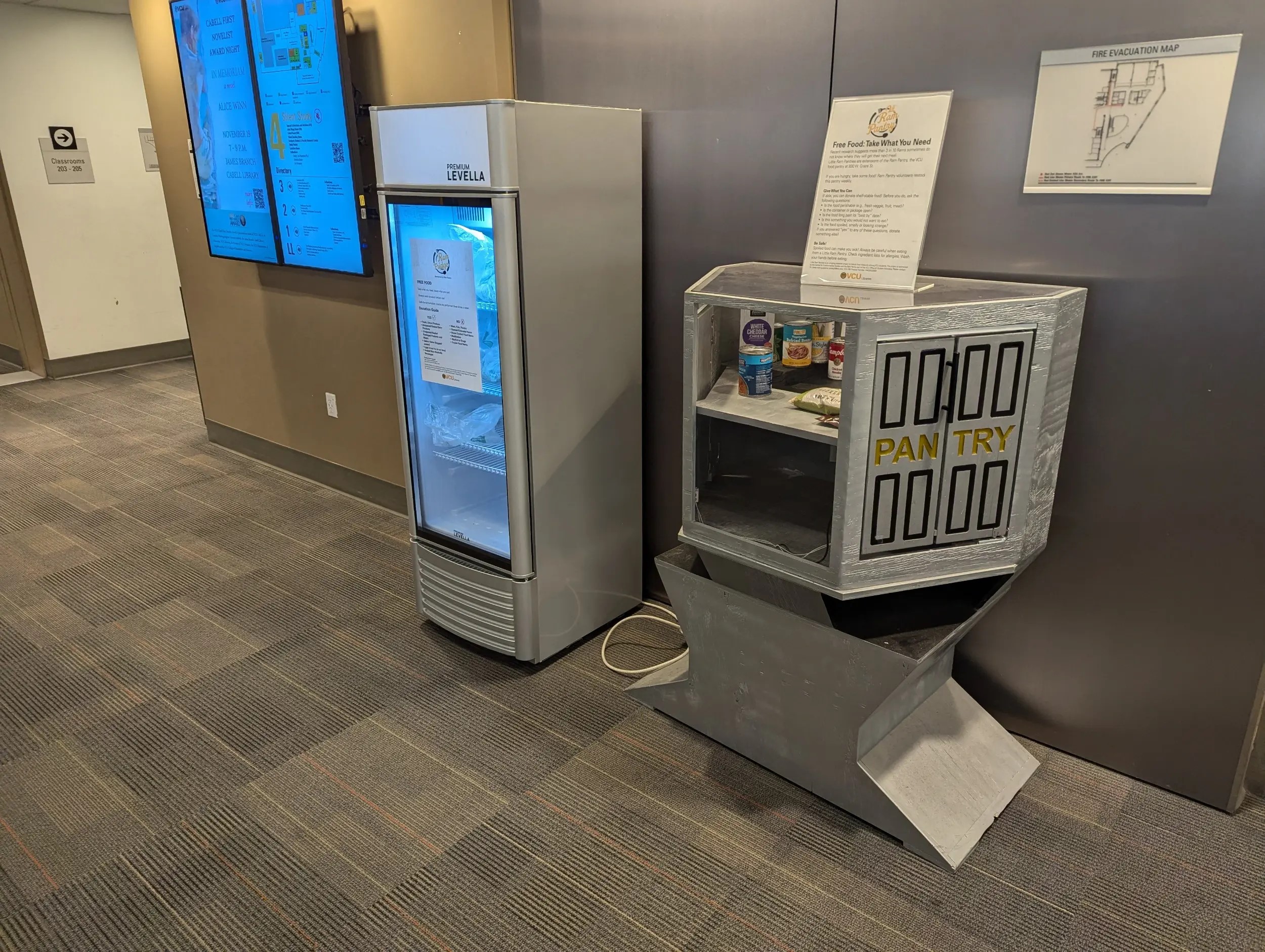Ram Fridges will provide fresh produce and other perishable foods to VCU students
November 7, 2024
About one in three Virginia Commonwealth University students experience food insecurity. Ram Pantry has helped feed these students for the past decade, first from its location in University Student Commons and now in a larger space on West Grace Street.
In 2021, John C. Jones, Ph.D., an assistant professor in the Center for Environmental Studies, installed the first Little Ram Pantries — inspired by the concept of Little Free Libraries — on the Monroe Park and MCV campuses to make it easier for students to grab food after class or on the way to the library. Sensors developed by Lauren Linkous, a VCU engineering doctoral candidate, and subsequently enhanced by teams of VCU engineering capstone students have shown that people “interacted” with the pantries more than 8,000 times during the 2021-2022 and 2022-2023 school years.
Jones and Youngmi Kim, Ph.D., professor in the VCU School of Social Work, conducted focus groups with students who use Little Ram Pantries and found that the satellite pantries help reduce the stigma associated with hunger. “They provide an anonymous and decentralized way of allowing emergency food services to be extended to the student population, promoting better access to food,” Jones said.
Students have requested more fresh food, including fruits and vegetables; Jones has responded with a new initiative: Ram Fridges. He has installed refrigerators in Ram Pantry and Cabell Library and plans to install a third in the Cary Street Gym later this fall. (A mini-fridge that lives in the Trani Center for Life Sciences stores produce from the building’s rooftop community garden.)
The idea for Ram Fridges was inspired by the RVA Community Fridges started by Taylor Scott, who graduated from VCU in 2019. Scott eats a plant-based diet and grows lettuce, corn, melons, tomatoes, herbs and more in a six-foot hydroponic tower in the corner of her apartment. (Hydroponic gardening involves growing plants in nutrient-infused water rather than soil, making it easy to grow food indoors.)

Three years ago, Scott was talking to a friend who lives in California and mentioned she didn’t know what to do with the excess fruits and veggies that would spoil before she could eat them. Her friend suggested she put them in a community fridge. Parts of California and Scott’s native New Orleans have community fridges, where people can drop off or pick up free fresh foods, but Richmond didn’t yet have any.
“I just decided, OK, I’ll try to put one up myself and then reach out to friends that are on my social media and see if they want to get involved,” Scott said.
One friend offered an extra refrigerator, and another offered to paint it with an eye-catching design. Scott found someone willing to put the fridge outside their small business on Venable Street in Church Hill and cover the electricity costs. Three years later, Scott runs the nonprofit RVACF, which oversees 14 refrigerators as part of the mutual aid project RVA Community Fridges and co-hosts weekly community cooking days at Matchbox Mutual Aid, thanks to the support of countless volunteers.
Jones, a Church Hill resident, saw a brightly painted refrigerator at a nearby library and thought the idea would work well on VCU’s campus.
Since joining VCU in 2019, Jones has published research on food production and emergency food access and has become a resource for other schools looking for ways to feed their students. The issue is personal for Jones: He experienced food insecurity during his adolescence and early 20s.
“There's a pact we've made in our society that says that we're willing to feed hungry kindergarten through 12th-grade students, but there’s this change that happens once someone turns 18 and they graduate high school and they go off to college,” Jones said. “It’s assumed that now, suddenly, they’re fully capable of handling all of their problems. And that's just simply not the case. If they were food insecure at 17, they’re likely to be food insecure when they get to college.”
“All of my work in supporting Ram Pantry and different initiatives is about trying to innovate better ways to help these students.”
Monetary or food donations can be made to RVA Community Fridges and Ram Pantry to continue to help feeding the community.
< Previous Next > Chat
Chat